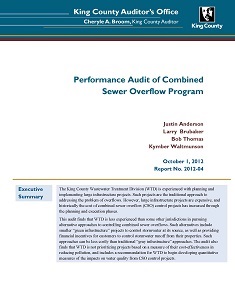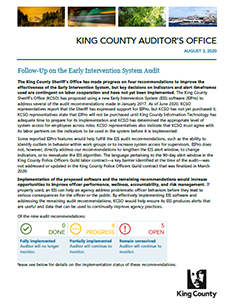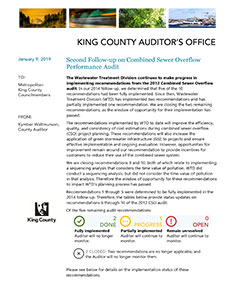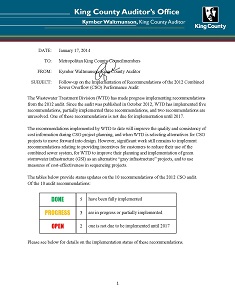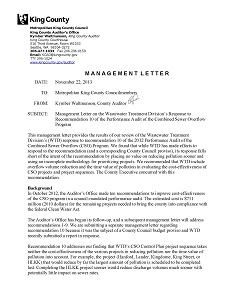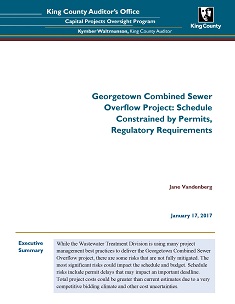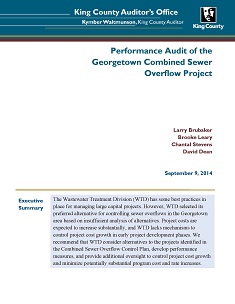Performance audit of combined sewer overflow program
October 1, 2012
NEW! Download the latest follow-up report
The general audit conclusion was that the Wastewater Treatment Division’s planning process for the CSO Program is professional and thorough, but opportunities exist for improving the cost-effectiveness of the Program. These opportunities include:
- Improving how life cycle cost analysis is used to select projects
- Using rate incentives to reduce the volume of stormwater entering the sewer system
- Enhancing planning for green stormwater infrastructure, and
- Considering project cost-effectiveness when sequencing projects.
The report includes 10 recommendations that could potentially improve the cost-effectiveness of the CSO Program.
Status
Of the 10 recommendations:
| DONE | 8 | Recommendations have been fully implemented. Auditor will no longer monitor. |
|---|---|---|
| PROGRESS | 0 | Recommendations are in progress or partially implemented. Auditor will continue to monitor. |
| OPEN | 0 | Recommendations remain unresolved. Auditor will continue to monitor. |
| CLOSED | 2 | Recommendation is no longer applicable. Auditor will no longer monitor. |
Summary
The federal Clean Water Act, as administered by the state Department of Ecology (Ecology), requires municipalities to control overflows from combined sewer systems. Ecology requires that King County achieve compliance with its control standards by 2030. In June 2012, the County Executive submitted an updated plan for achieving control of overflows at an estimated cost of $711 million (2010 dollars). The County Council requested this audit to evaluate the cost effectiveness of the Combined Sewer Overflow (CSO) Control Plan.
The Wastewater Treatment Division’s (WTD) planning process for the CSO control program is professional, thorough and transparent. Nevertheless, we found several areas for improvement.
Project Costs: The $711 million estimate to achieve CSO control is a planning-level estimate with a wide range of uncertainty. Based on performance of past projects, the actual cost is likely to exceed the $711 million estimate. We have identified areas which could reduce the ultimate cost of the CSO control program, including a more thorough analysis of using green stormwater infrastructure as an alternative to gray infrastructure, improvements in life cycle cost analysis, and using rate incentives to reduce the volume of stormwater entering the system.
Project Effectiveness: The sequencing of projects in the proposed CSO Control Plan does not take into account the effectiveness of the various projects in reducing pollution. We found that some of the projects necessary to control CSOs achieve control at a far lower cost per gallon of discharge than others. This report provides an illustration of how re-sequencing control projects could remove an additional 3.5 billion gallons of CSO discharge, with about the same impact on rates as the sequence in the currently proposed plan. This kind of information can be of value to county policy-makers, and can be used as a way to quantify the opportunity costs of choosing one sequence of control projects over another.
Our recommendations are intended to increase the cost-effectiveness of the CSO control program by:
- Improving the planning and implementation of green infrastructure projects.
- Improving how life cycle cost analysis is used to select projects among alternatives, and revisiting alternatives if there is a significant change in the cost of the selected alternative.
- Providing rate incentives for customers to reduce their use of the system.
Considering the effectiveness of the projects in removing pollution when sequencing projects.
Reports related to this audit
Click on the images below to view the follow-up reports.
Click on the image(s) below to view related reports.
|
January 17, 2017 |
September 9, 2014 |
Audit team
Justin Anderson, Larry Brubaker, Bob Thomas, and Kymber Waltmunson conducted this audit. If you have any questions or would like more information, please call the King County Auditor's Office at 206-477-1033 or contact us by email KCAO@kingcounty.gov.

 Translate
Translate
